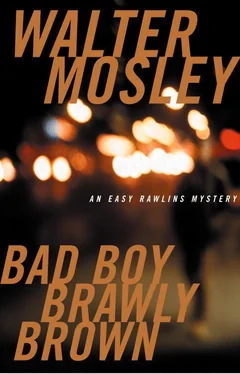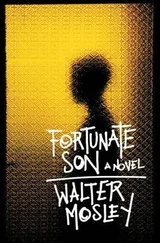“What do you know about our informants?” He tried to sound threatening but I could see the worry in those wormy lips.
“Just a guess, man. Only way you could keep tabs on one black man is through another one. That shit goes all the way back to the plantation.”
“All you want is Brawly Brown?” There was humor in Lakeland’s question. “And you don’t want to be paid?”
“That’s right.”
“How can I be sure that you won’t use what I give you against us?”
“You mean if I tell Tina where Xavier lives at?”
“Have you ever heard of Vietnam, Mr. Rawlins?”
“Yeah. That’s over in Asia, right? Where the French got their butts kicked.”
“There’s red-blooded American men over there right now fighting for your right to vote and pray and walk down the street without being molested. Those men are black as well as white. I was with them only six months ago. I don’t hate your people. I only hate the enemies of democracy. These radicals, these black revolutionaries are undermining the foundation of our democracy. I don’t care that they have a valid complaint. We all have problems. But regardless of those problems, we cannot threaten the land that our children and their children will inherit.
“Brown is just a misguided pawn. He doesn’t know anything. He follows whatever fool yells the loudest. People like this Xavier Bodan and his girlfriend Tina Montes, they have a whole army of young fools like him. If you can help us, we’ll help him.”
I was thinking that white America also had an army of young fools like Brawly, that all the young men in all the history of the world were like him. Young men fighting and dying for ideas they barely understood, for rights they never possessed, for beliefs based on lies.
“I was in the army,” I said. “I know what it’s like to fight a war. So believe me when I tell you that I know what you’re talking about.”
A buzzer went off and Lakeland picked up his phone. It flashed through my mind that the colonel was just talking to fill up the time, that he was having his people do some kind of check on me and now I was about to be arrested. I resisted the sudden urge to jump across the table and strangle the patriot.
“Yes? What?” he said. “No.” Then he looked up at me and asked, “What do you know about Henry Strong?”
The room turned cold, which meant that I had begun to sweat.
“Only what I heard that night at the meeting,” I answered honestly. “Never even heard of him before that night.”
“Did you know him?”
I thought of the pictures that Knorr had of me at the First Men’s storefront. Were there pictures of Strong and me at the late-night diner?
“Not really.”
“What does that mean?”
“It means that I don’t know anything about Strong.”
Lakeland was suspicious of me. But he was suspicious of everybody right then.
“I have an emergency meeting to attend, Rawlins. Mona will give you the addresses you need.”
I stood up, a little surprised that I had managed to maintain my freedom.
“But don’t fuck with me,” Lakeland said.
That was a long time ago, 1964, when most white men in suits didn’t use the ghetto’s slang.
“Don’t fuck with me,” he repeated. “Or I will burn your ass down.”
Mercury Hall lived on Caliburn Drive. It was an ideal street for L.A. living, a road that went nowhere — a short street that ran in a kind of zigzag semicircle that both entered and exited on Eighty-eighth Place. All you ever saw were your neighbors and the occasional motorist who’d lost his way. Any suspicious character caused a flurry of phone calls because everyone was on their guard for trouble.
Blesta Ridgeway-Hall and Mercury had made a beautiful home. Lemon trees on either side of the front door and rosebushes at the curb. The grass was shaggy and just watered. It was a small house with a green roof and white walls. The front door was oak with a double wall. The outer surface had a tree and a crescent moon cut out of it.
A curtain on a window to my left fluttered.
“Mommy, it’s a man,” a child yelled from somewhere behind the closed door.
I had knocked on the door, just above the moon. The sound was a resonant tenor drumbeat.
I waited, counting the seconds of hesitation until the door opened.
Blesta was about five-five with light brown curly hair, light brown skin, and dark brown eyes. She was the beauty and the brains of the sisters that Mercury and Chapman married.
“Mr. Rawlins,” she said. “Mercury ain’t here.”
“No? When’s he comin’ home?”
“Um, I don’t know.”
“Listen, B, I got to talk to him. But I understand if you don’t want a man waitin’ in the house alone with you. I could sit out in the car, no problem.”
“I really don’t know when he gonna be home, Mr. Rawlins. You know, two or three times a week him and Kenny go out for a drink and a game’a snooker after work.” Blesta was almost pleading with me.
“I’ll wait out in the car,” I said.
“No. No, come on in. If you sit out there, all the neighbors gonna be yackin’ back an’ forth till one of ’em call the police and then Mercury get mad at me for gettin’ you arrested.” Blesta backed away from the door and I entered the small and perfectly ordered home.
The Halls’ front door led right into the living room. Blesta had two yellow chairs with a matching sofa. The plush chairs had turquoise hassocks with walnut legs. The carpet was formed out of concentric ovals of dark blue and light green. A six-foot avocado sapling filled one corner and a big console TV sat in front of the couch.
The picture window beside the door looked out upon my green Pontiac. The room managed to be both peaceful and festive.
“Boo!” little Artemus Hall shouted at me.
The four-year-old jumped out from a doorway, yelled his scary word, and then fell down laughing.
I laughed, too. It was the funniest thing I’d seen in the past few days, days that seemed like months. I caught myself before the laughter turned hysterical.
“Go get your coloring book, Arty,” Blesta said.
“No,” he told her. And then to me, “Will you gimme a piggyback ride?”
“My back is a little sore today, partner,” I said. “But why don’t you come over here and make a picture for me?”
“Okay,” Arty chirped, and then he ran full speed out of the room.
I sat on the couch.
“Can I get you something, Mr. Rawlins?”
“Could you see your way to callin’ me Easy?”
“Yeah, I guess.”
“You guess what?”
“Easy.” Blesta’s smile was the axe that brought Mercury low. Her whole face seemed to ignite behind that grin.
Artemus came thundering back from his trove of toys with at least six coloring books under his arm. There was one of circus performers and animals and one filled with cowboys and Indians. He even had a coloring book of different kinds of houses throughout history.
I asked for a sad clown and he looked until he found one.
Blesta had to do work elsewhere in the house, so I sat with Arty while he carefully rubbed the Crayolas onto the newsprint outlines.
“Look at this, Mr. Raw-wins,” he’d say, showing me the tangle of yellow lines he’d used to fill in the clown’s upturned hands.
And... “Look at this” for the red eyes or the green mouth.
I sat there as peacefully as I had been at work earlier that morning.
I needed peace. There were two dead men on my mind: Aldridge Brown and Henry Strong.
I tried to think of what the two men might have in common other than Brawly — but nothing came to mind. Then I tried to figure why the boy would want to kill either man. Again I came up blank.
Читать дальше












